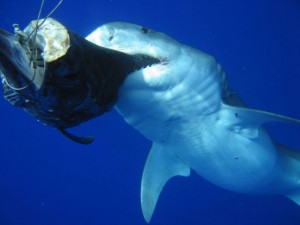Bermuda Tiger Shark Research Spotlighted
 The Bermuda Tiger Shark Project’s work on the mysterious migratory habits of these feared but increasingly endangered sea creatures is the subject of a major report at a leading global sciences website.
The Bermuda Tiger Shark Project’s work on the mysterious migratory habits of these feared but increasingly endangered sea creatures is the subject of a major report at a leading global sciences website.
Headed by veteranarian Dr. Neil Burnie and conservationist-documentarian Choy Aming, the Bermuda Tiger Shark Project’s work in conjunction with the Guy Harvey Research Institute (GHRI) at Florida’s Nova Southeastern University is highlighted this week at OurAmazingPlanet.com.
Partnered with Fox News, CBS, MSNBC and various on-line news outlets, the Bermuda Tiger Shark Projects work is expected to receive widespread worldwide coverage in the coming days.
“Tiger sharks have gained notoriety for their voracious appetites – they’ll devour just about anything, from sea turtles to kegs of nails to a few unlucky humans – yet of late, it is their mysterious travel habits that have excited interest in the scientific community,” said OurAmazingPlanet.
“Where these large sharks spend critical times of their lives has remained in the dark, but recently, researchers at a university in Florida announced the most extensive tracking ever of tiger sharks’ mysterious migratory wanderings. And what they found was surprising.
GHRI director Mahmood Shivji told the website: “The results that we found were completely unexpected.
“We didn’t have a clue that these tiger sharks would make these long-range migrations.”
Working alongside the Bermuda Shark Project since 2009, the GHRI has fitted tiger sharks with satellite tags in the island’s waters and then tracked the animals’ subsequent movements.
“No one has [previously] been able to do that … so we’re very lucky,” Mr. Shivji told OurAmazingPlanet.
From Bermuda, the tagged sharks head to the Bahamas, and, after spending several spending months in the Caribbean, turned and swam northeast to the middle of the Atlantic Ocean.
“What are they doing in the middle of the Atlantic?” Mr. Shivji said. “Is it food, is it sex?”
Mr. Shivji said the only likely theory the team has come up with so far involves sea temperatures and perhaps the sharks follow warmth.
The GHRI director said while population data on tiger sharks remains incomplete, there are indications the species’ numbers have been in decline in recent years.
“There are more records of more tiger sharks being caught in the past, versus tiger sharks being caught now,” Shivji said.
And though he cautioned that the behaviour of the tiger sharks tagged off Bermuda are not necessarily indicative of the habits of an entire species, he said the information collected so far is compelling.
“Tiger sharks are quite enigmatic: very little is known about their biology in terms of where they pup, and where they mate,” Mr. Shivji said, “We want to understand where they spend most of their time, and at the time of their most critical life history.”
The Bermuda Shark Project is being supported by the Atlantic Conservation Partnership (ACP) – formerly Friends of the Bermuda Aquarium. Launched in 1993 as a US public charity, the ACP permits tax deductible contributions for US donors.
The Bermuda Aquarium, Museum & Zoo (BAMZ) was established in 1926 by the Bermuda Government and has become a leader in environmental conservation, education and research through the efforts of its two support agencies, the local charity Bermuda Zoological Society (BZS) and the ACP.
Read More About
Category: All, Environment, News
Comments (5)
Trackback URL | Comments RSS Feed
Articles that link to this one:
- Bermuda Shark Project Presentation : Bernews.com | November 16, 2011


ay dun i got no problem with tigers, but tiger SHARKS??? How u gon combine 2 of de most dangerous animals pon de world and tell me that they’re our “friends”? Look, um all for environmental conservation and all det deya, but guyz need to draw a line somewhere….just sayin. What r guyz gunna say when de youts r swimmin at horshoe bay and one of dem gets there bloodclat leg bitten off?? WAKE UP PEOPLE
Dont go swimming then cause the giant squid will get you too…
oh flep dun, ya serious? where’s it to?
Most likely to be seen off of south shore… But chances are you wont see them at all.. But they are there and they are just as dangerous as the sharks.